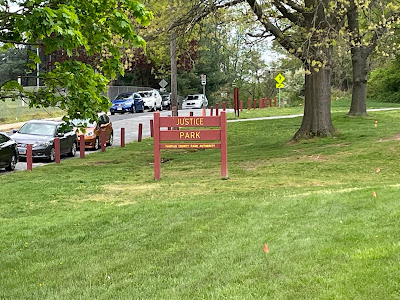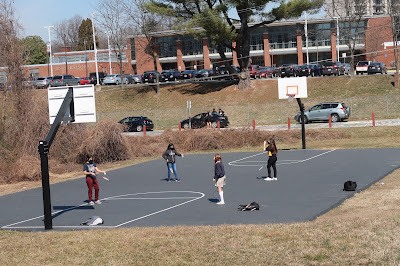Board of Supervisors reauthorizes Park Authority for 30 years, despite complaints from Justice Park advocates
 |
| Justice Park, where the Park Authority wants to pave over parkland for a parking lot. |
Nearly all of the community members who spoke at a Board of Supervisors hearing July 13 urged the board not to approve a 30-year extension of the Park Authority ordinance.
They cited the lack of accountability and transparency around the Justice Park parking lot issue as the main reason for extending the Park Authority for just two or three years while a review can be undertaken to determine the best organizational structure.
The residents spoke about how the Fairfax County Park Authority (FCPA) failed to inform the public about the plan to give up land in Justice Park for a parking lot to accommodate an addition to Justice High School and refused to answer residents’ questions about whether alternatives were considered.
They also noted an FCPA official insisted no decisions were made, while emails obtained through a Freedom of Information request showed the Park Authority Board agreed to continue the negotiations in closed-door sessions.
Despite those complaints, the BoS voted unanimously to continue the Park Authority ordinance until Oct. 28, 2051.
McKay acknowledges public’s concerns
Board Chair Jeffrey McKay acknowledged the Justice Park parking lot is “clearly an uncomfortable situation,” but should not be an impediment to extending the Park Authority as an independent agency for the next 30 years.
Before a decision is made on the parking lot, McKay said, “we should work out something mutually beneficial” in terms of the equity and environmental concerns raised by residents.
Related story: Public officials failed to inform public on Justice Park land negotiations
“I’m troubled by what I’ve heard today,” said Mason Supervisor Penny Gross, referring to the testimony about Justice Park. “I don’t recognize the Park Authority in many of the comments today. Their work with the community has been outstanding.”
“There’s been some misinformation and a lot of angst about one particular park,” Gross said. “We should not use one park to restrict the work that has been going on.” And just because the ordinance will be extended to 2015, “doesn’t mean we can’t make changes.”
Sara Baldwin, the acting director of the FCPA, told the BoS there have been no decisions on Justice Park. “We are listening to the public; we are looking at alternatives.”
Lack of transparency
Here’s a brief summary of some of the comments from the public during the hearing:
“The Park Authority is fine with giving up precious parkland. That is not acceptable,” said Ravenwood Park resident Carol Turner. In a highly diverse area with limited parkland, reducing green space is not compatible with the board’s One Fairfax policy on equity.
Kathleen Brown, president of the Ravenwood Citizens Association and a Justice High School PTSA member, told the board that paving over parkland in a community with the highest socioeconomic needs doesn’t meet the Fairfax County Park Authority (FCPA) goals of providing recreation experiences and promoting healthy lifestyles for all community members.
 |
| The proposed parking lot would replace the basketball court. |
Brown urged the BoS to reauthorize the FCPA for two years while a study is carried out – with extensive community engagement – to determine whether revisions are needed in the agency’s organizational model.
That’s necessary, Brown said, because “The Park Board is secretive with decisions made behind closed doors.” Emails obtained through a Freedom of Information request show the board discussed the parking lot during nine board meetings, while keeping the public in the dark about a land swap with Fairfax County Public Schools involving the Cub Run RECenter in the Sully District.
Because Park Board members are appointed and not elected, “they are not directly accountable to the public,” Brown said. When the Justice Park advocates sent an email to all 12 board members, “we didn’t hear back from a single one.”
Equity issues
Lydia Lawrence, speaking on behalf of the Fairfax County NACCP’s Environmental Justice Committee, noted that when Justice High School (formerly named for Confederate JEB Stuart), was created, the Denny family and other African Americans who owned small farms along Peace Valley Lane were forced to give up their land by eminent domain.
Now, Lawrence said, the FCPA wants to diminish the only park accessible to the Culmore community and further reduce parkland in an area where parkland is scarce. FCPA “failed to realize the gross inequity of taking parkland from a diverse community with scarce resources,” she said.
Citing One Fairfax, Lawrence urged the BoS to “honor the history of the black families who had their land taken to create Justice Park.”
Related story: When Justice Park was created, Black families were displaced
Ravenwood Park resident Mark Doehnert said the effort to pave over part of Justice Park not only goes against One Fairfax, it violates the state law requiring a Comprehensive Plan amendment and goes against the Park Authority’s goals and objectives and the county’s policy on sustainability.
Any plans to sell or give up parkland should need approval by the BoS, Doehnert said.
Park board not accountable to the public
Having the Park Authority operate as a separate county government entity is no longer appropriate, according to a statement from two former Park Board members, Marie Reinsdorf and Anthony Vellucci.
The current structure is inefficient and costly, and because Park Board members are not elected, they aren’t accountable to the public, they maintained. Also the FCPA tends to focus on big-ticket, revenue-generating projects, rather than trails, which have more public support.
The discussions on Justice Park revealed Park Board members “feel no obligation to respond to public requests,” said Whitney Redding, of Friends of Holmes Run. “It’s not clear to whom they are listening – to the public, or the supervisors who appointed them, or the park staff.”
Nazir Bhagat, a Mason District resident, said the additional parking spaces are not even needed, and called for the BoS to consider street parking, ride sharing, and other alternatives to paving over land in Justice Park.
More parks needed
Mason District resident Ann Bennett, the land use chair of the Sierra Cub’s Great Falls Group, spoke about the importance of parks to help the county reduce greenhouse gas emissions, preserve the tree canopy, and meet other environmental sustainability goals.
A recent report on WUSA9 about Annandale being one of the “hottest heat islands in the state” illustrates the seriousness of this, she said. Temperatures on paved surfaces in Annandale peaked at more than 140 degrees on July 6.
Bennett called Justice Park a microcosm of how the current system isn’t working, citing the lack of public notification, the lack of public engagement, the lack of transparency, and the “strange cone of silence.”
Instead of reducing parkland, she called for the county to increase its investment in land acquisition. Mason District needs more local parks, she said.
The Park Authority’s mission to protect natural resources is being ignored, while the system is overly focused on large recreation centers, said Annandale resident Amy Gould. “We have the same people running this system as we had 20 years ago. We deserve a better system.”


What I said was: "the 23 parking spaces to be built on Justice Park are not needed and based on faulty assumptions that a 20% increase in student enrollment will require 20% increase in staff, and therefore, parking. Further there is abundantly available street parking around the School for the 23 spaces. It is cost effective to at least postpone destroying a part of Justice Park until the need for the 23 spaces materializes in the future." Nazir Bhagat
Agreed, there is plenty of street parking. I think that the real issue is revenue. Students have to buy permits to park in the parking lot ($100 each?) and the number of those spaces are limited for this racket. Add more spaces, add more revenue
Another one of Penny Gross' pet projects with the park Authority, so of course the board would approve it. A continuation of business (deep pockets) as usual and ignoring the community's wishes when it comes to this high school – starting with the naming process which totally ignored the majority vote choice by the polled community (and over 50 years of school alumni) when it came to "choosing" the name that was already preselected one by the committee.
On an additional note, Stuart got a total renovation that was completed in 2005 or 2006 – why is it getting another? Does the FCSB's "feel better pet project" need a facelift already?
Justice isn't getting a full renovation; it's getting a new addition to address overcrowding (although FCPS puts kids at other overcrowded high schools in cheap trailers and modulars instead). FCPS could probably save money and leave Justice Park alone if it waited until the ongoing renovation and expansion of Falls Church HS was completed, and then redraw the Justice/Falls Church boundaries, but they are probably worried that any boundary change might further concentrate poverty at Justice HS and create additional accreditation issues in the future.
LOL
You must be kidding, almost all residents objected but the board completely ignored them?
i am shocked! (NOT)
This is how corruption looks like.
See you again in 30 years
(And on the next election, when the stupid residents will vote again for the same ppl who screwed them over)
Anonymous 7/15 – You are so right!